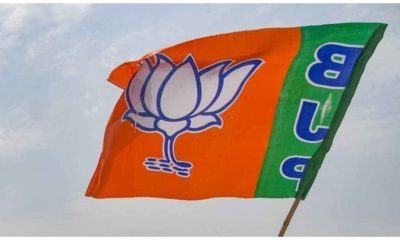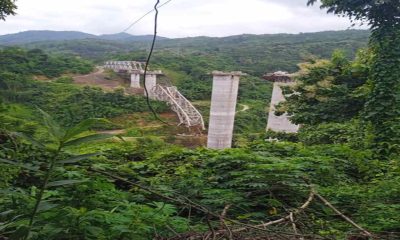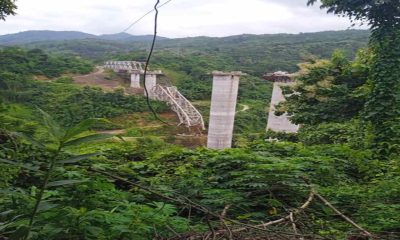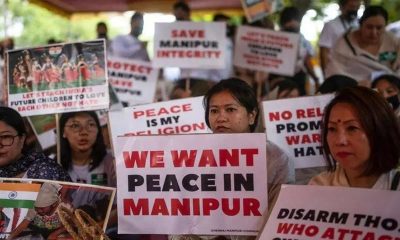India News
Climate change blues: ‘everyday monsoon’ foxes Mizo farmers
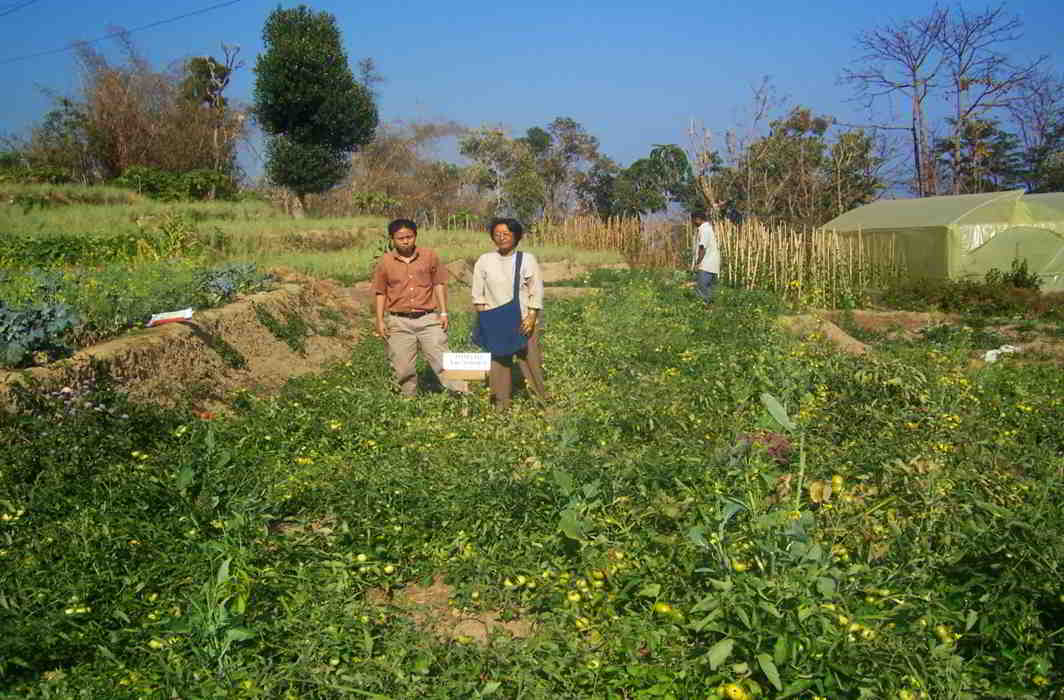
By Dinesh C Sharma
Changing rainfall pattern, rising temperatures force farmers to switch from traditional farming to growing exotic, heat resistant crops
Aizawl: As the debate continues on connection of climate change with growing intensity of hurricanes like Harvey and Irma, the phenomenon is already becoming a ground reality for scores of farmers in the north eastern hill state of Mizoram. Changing rainfall pattern and rising temperatures are forcing them to move away from traditional farming and to grow exotic crops that are heat-resistant and can survive erratic rains.
This year has been particularly bad. There has not been a single day when it has not rained. “Farmers are completely confused. They don’t know whether it was early monsoon or it is ‘everyday monsoon’. All important dates on the agriculture calendar have been missed,” pointed out Dr James Lalnunzira Hrahsel, a scientist with the Mizoram State Climate Change Cell.
Data of the past thirty years shows a rise in average temperature of Aizawl in the month of January. The lowest maximum was 18.7 degree in 1992 while the highest was 28.2 degree in 2005. This January it was 26.3 degree. On the other hand, minimum temperature in January has dipped. The difference between daily minimum and maximum temperature has been widening. The maximum and minimum temperatures in July also have seen a similar trend.
The rainfall pattern has changed so drastically that farmers are left clueless. The dates for burning jhums (shifting cultivation) had to be shifted twice this year due to rains. While there is an increasing trend in monsoon rainfall, there is decrease in post-monsoon rainfall and winter rainfall. Heavy precipitation events have gone up.
“The rainfall pattern in Mizoram has traditionally been so nuanced that Mizo language has different names for rain during different months, like To ruah (for April-May rains), Ruah Bing (for June-July rains), Ruah var pui (September rains), Ai Ruah (for October rains), Pawl del Ruah (December rains) etc. Even wind patterns have unique names – Vahtlao thli (February winds), Pa-sawntlung thli (March to May) and Pa leng thli (July winds) etc.,” explained Dr Lalrokima Chenkual, a disaster management expert with the Administrative Training Institute.
“But nowadays, it is difficult to distinguish one rain or wind from another,” said Dr Chenkual.
All this is directly affecting farming communities. “Earlier farmers could grow a variety of fruits and vegetables throughout the year. Now they are approaching us to help them with new crops and varieties that can withstand changing climate. That’s why we have introduced dragon fruit from Thailand, new cabbage variety from China and two tomato varieties from Bangalore,” Henry L Varte, horticulture extension officer, told India Science Wire.
Dragon fruit is a cactus that can grow in warm and humid climate, needs less water and its fruits have high commercial value. As dragon fruit is climbing cacti, concrete pillars are erected to train the vine and on the top old tyres are used. “Dragon fruit cultivation is helping famers to adapt to rising temperature and erratic rainfall, while protecting their incomes,” said Varte. Similarly the cabbage variety imported from China is heat-resistant. Two tomato varieties – Araka Smrat and Araka Rakshak – developed by the Bengaluru-based Indian Institute of Horticulture Institute can withstand high temperatures and are disease-resistant.
“Earlier I used grow oranges from seedlings imported from Israel, but pest attacks started due to heat and the yield dropped. Then I planted area nut. Last year I shifted to dragon fruit and have harvested 20 quintals of fruits this year. The market for this fruit is good, each fruit of about half a kilo sells for about Rs 100 to Rs 150,” said Zoramthanga, a dragon fruit farmer from Viapuanpho village in Mamit district.
Saurabh Sharma, state nodal officer for climate change, said adaptation had become necessary as districts in the state face ‘moderate to high’ vulnerability to climate change in terms of agriculture, forestry and water sector. The National Adaptation Fund for Climate Change is funding a three-year project to augment livelihood of rural communities by building resilience in agriculture in four districts – Aizawl, Mamit, Kolasib, Serchhip.
“The idea is to develop one climate resilient village in each district so that they can serve as model for the rest,” Sharma explained while speaking at a media workshop. Pradeep Chettri from Directorate of Agriculture (Crop Husbandry) said pilot projects were underway in three agro-climatic zones – humid mild tropical zone, humid sub-tropical hill zone and humid temperate sub-alpine zone- to increase tolerance and suitability of crops to climate change.
The media workshop was organized by the Indian Himalayas Climate Adaptation Programme (IHCAP) and Department of Science and Technology (DST) in collaboration with Mizoram State Climate Change Cell; Directorate of Science and Technology and Centre for Media Studies.
(This article is from a syndicated feed provided by the India Science Wire)
2024 Lok Sabha Elections
Farooq Abdullah accuses PM Modi of trying to divide the country over religion
Faroukh Abdullah reacted to PM Modi’s remark that the Congress will redistribute people’s money and property to Muslims if voted to power and said Muslims respect all religions. He said that they are Muslims and Allah has told them to respect other religions. He further added that a Muslim cannot snatch anyone’s right.

Farooq Abdullah, Jammu and Kashmir’s National Conference President said on Wednesday that Prime Minister Narendra Modi was trying to divide the country over religion. He also said that those who will vote for them must prepare for hell. Farooq Abdullah said Muslims cannot snatch away the rights of others.
Farooq Abdullah also called Prime Minister Narendra Modi-led government a threat to the survival of the country. Omar Abdullah, former Jammu and Kashmir chief minister cautioned the people not to divide this country on the basis of religion, otherwise a storm will unleash making the survival of the nation difficult. He said it is better to talk about uniting the country, instead of dividing its people.
He was addressing an election rally in Thanamandi area of the Rajouri district in Jammu and Kashmir. The Anantnag parliamentary constituency will go for elections on May 25. Faroukh Abdullah reacted to PM Modi’s remark that the Congress will redistribute people’s money and property to Muslims if voted to power and said Muslims respect all religions. He said that they are Muslims and Allah has told them to respect other religions. He further added that a Muslim cannot snatch anyone’s right.
He remembered an incident when former Prime Minister Rajiv Gandhi once stopped his car in Pulwama and assured a poor Hindu woman that he would give her a mangalsutra as she could not afford it. Farooq Abdullah said those who were against the INDIA bloc are against the nation.
Prime Minister Narendra Modi had earlier sparked a controversy last month as he commented that the Congress would take away the hard-earned money of the masses and distribute them among infiltrators and those with many children. Speaking at a rally today, the Prime Minister took a jibe at the Congress and said the governments in the past were not able to implement the Indian Constitution in Jammu and Kashmir. He was referring to the revocation of Article 370.
India News
Karnataka CM Siddaramaiah writes to PM Modi, urges home ministry to cancel diplomatic passport of Prajwal Revanna
CM Siddaramaiah wrote in the letter to PM Modi that he must be aware of the serious case of alleged sexual exploitation of a number of women by the sitting Hassan Lok Sabha member of Parliament (MP) and the NDA candidate, Prajwal Revanna, for the same constituency for the ongoing 2024 Lok Sabha elections.
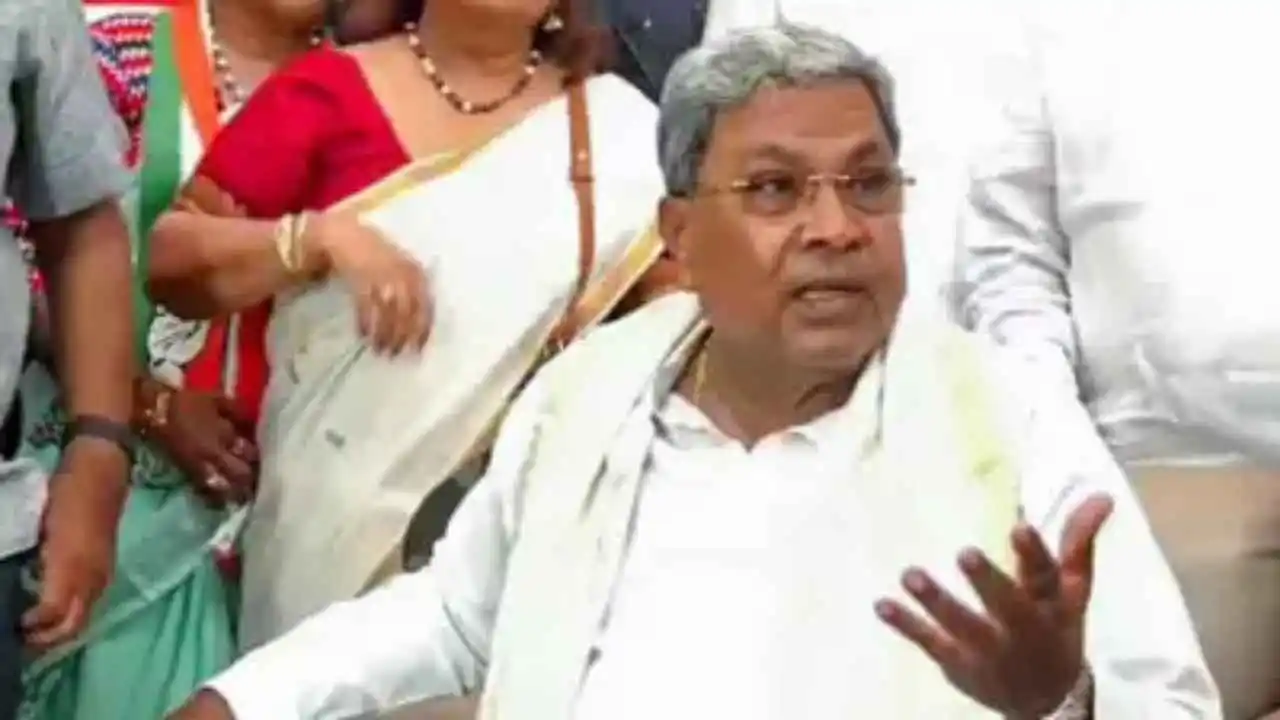
Karnataka Chief Minister Siddaramaiah on Wednesday wrote to Prime Minister Narendra Modi, where he urged the Home Affairs Ministry to cancel the diplomatic passport of Prajwal Revanna. Earlier a day before Revanna was suspended by JD(S) amid a row over explicit videos. Revanna is believed to have escaped to Germany shortly after the first phase of elections ended in Karnataka on April 26, in which he was JD(S)-BJP’s candidate from Hassan.
CM Siddaramaiah wrote in the letter to PM Modi that he must be aware of the serious case of alleged sexual exploitation of a number of women by the sitting Hassan Lok Sabha member of Parliament (MP) and the NDA candidate, Prajwal Revanna, for the same constituency for the ongoing 2024 Lok Sabha elections.
The Karnataka Chief Minister wrote in letter that the Congress government in Karnataka has constituted a Special Investigation Team to investigate the allegations against Revanna. The SIT is working day and night to investigate the allegations of crimes against several women by Prajwal Revanna and getting him back to the country is of utmost importance so that he faces investigation and trial as per the existing law of the land.
Siddaramaiah urged PM Modi to move the Home Ministry to take swift action to cancel the diplomatic passport of Prajwal Revanna and appropriate action must be taken using diplomatic and police channels of the Government of India as well as international police agencies to ensure the swift return of the absconding member of parliament to face the existing law of the land.
Suspended JD(S) leader Prajwal Revanna, accused of sexually assaulting multiple women, broke his silence on Wednesday and said that truth will prevail soon. In his first response since the controversy erupted, Prajwal Revanna said on X that he is not in Bengaluru currently and has communicated the same to CID.
India News
Amit Shah says BJP will neither remove reservation for SCs, STs and OBC, nor will allow Congress to do so
The Home Minister alleged that the Congress’ formula was to speak lies loudly, publicly and repetitively. He advised Congress president Mallikarjun Kharge not to speak lies for a family as eventually he will have to take the blame for the party’s loss in the Lok Sabha elections

Union Home Minister Amit Shah on Wednesday continued to attack Congress over reservation row. He was addressing a rally in Katghora town of Chhattisgarh’s Korba district to campaign for Saroj Pandey, BJP candidate from the Korba Lok Sabha seat where Shah said BJP will neither remove reservation for SCs, STs and OBCs, nor will it allow Congress to do so.
The Home Minister alleged that the Congress’ formula was to speak lies loudly, publicly and repetitively. He advised Congress president Mallikarjun Kharge not to speak lies for a family as eventually he will have to take the blame for the party’s loss in the Lok Sabha elections. Shah accused Congress of nurturing terrorism and Naxalism to win the Lok Sabha elections.
Shah further added that Congress claims if Prime Minister Narendra Modi ji gets majority for the third term, he will scrap reservation. He said the grand old party has even circulated his fake video. Shah said that have been in power for the last 10 years and PM Modi did not remove reservation, nor will he do it in the future.
The Union Home Minister further asserted Modi ji used the majority to scrap Article 370 and triple talaq, construction of Ram Mandir in Ayodhya and introduce the Citizenship Amendment Act. He further told the Congress President Mallikarjun Kharge that Rahul Gandhi and Priyanka Gandhi do not belong to anyone. He said on June 4 Congress will suffer defeat and the brother-sister duo will remain safe, but Kharge ji will be blamed.
Shah further asserted if PM Modi becomes the prime minister for the 3rd straight term, then Naxalism will be uprooted in two years in Chhattisgarh. Shah targeted the previous Bhupesh Baghel-led government in Chhattisgarh and said, The Bhupesh Kakka government encouraged Naxalism, but after the BJP came to power in the state under CM Vishnu Deo Sai and Deputy Chief Minister Vijay Sharma 95 Naxalites have been eliminated in 4 months.
-

 Entertainment8 hours ago
Entertainment8 hours agoOn wife Anushka Sharma’s birthday, Virat Kohli says he would’ve been lost without her
-

 Entertainment7 hours ago
Entertainment7 hours agoPushpa Pushpa: Allu Arjun starrer Pushpa 2 first song released
-

 Cricket news13 hours ago
Cricket news13 hours agoK Srikkanth slams Rinku Singh’s exclusion from T20 World Cup squad, says Rinku Singh has been made a scapegoat
-

 Cricket news14 hours ago
Cricket news14 hours agoIPL 2024: Marcus Stoinis scores half century to help Lucknow Super Giants beat Mumbai Indians by 4 wickets
-

 Entertainment13 hours ago
Entertainment13 hours agoKatrina Kaif deepfake video goes viral, social media says it is getting scary
-
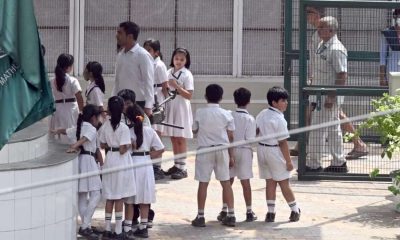
 India News14 hours ago
India News14 hours agoDPS Dwarka, Amity, several other Delhi-NCR schools get bomb threat, Central agencies launch probe
-
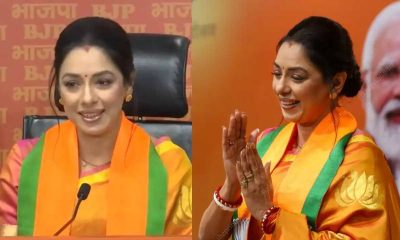
 2024 Lok Sabha Elections12 hours ago
2024 Lok Sabha Elections12 hours agoLok Sabha elections 2024: Anupamaa actor Rupali Ganguly joins BJP, says she feels she should also be a part of this Mahayagya
-

 2024 Lok Sabha Elections11 hours ago
2024 Lok Sabha Elections11 hours agoPriyanka Gandhi says PM Modi is far away from reality of common people, calls him an egoistic person





